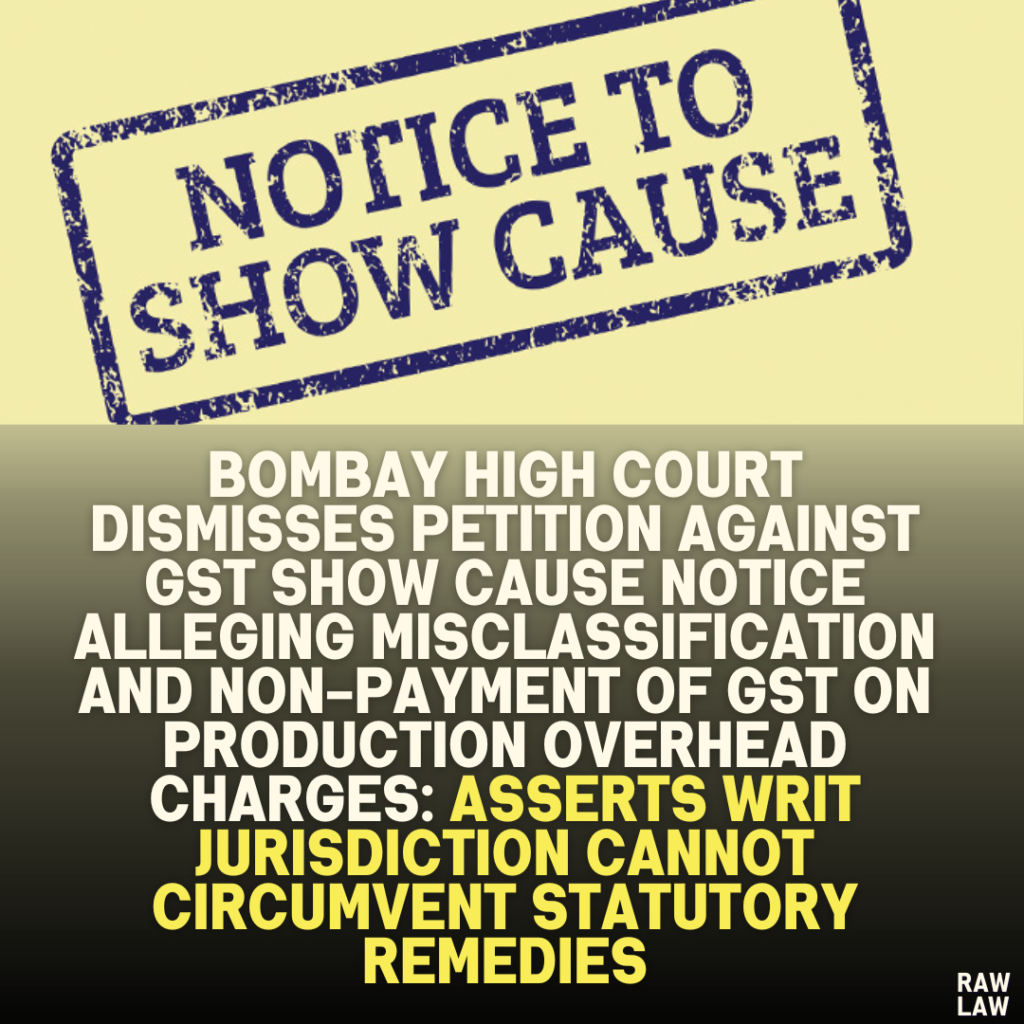Court’s Decision
The High Court of Bombay dismissed the petition challenging the show cause notice issued under the Central Goods and Services Tax (CGST) Act, 2017. It ruled that the petitioner had not demonstrated any jurisdictional defect or ultra vires actions in the notice. The Court reiterated that the petitioner should first exhaust statutory remedies available under the GST framework before seeking relief in a writ petition.
Facts
- Nature of the Dispute:
The petitioner, a manufacturer of alcoholic beverages, entered into a license agreement with a brand owner. The business arrangement involved producing beer under certain brands. The Directorate General of Goods and Services Tax Intelligence (DGGSTI) issued a show cause notice alleging:- Non-payment of GST on production overhead charges associated with manufacturing beer for a specific brand owner.
- Misclassification of by-products like spent grain under a Harmonized System of Nomenclature (HSN) code that attracted a lower GST rate (nil), whereas a 5% rate was applicable.
- Challenge to the Notice:
The petitioner claimed that the show cause notice sought to impose GST on alcoholic liquor for human consumption, which is constitutionally outside the purview of the Central Government’s taxing authority under the CGST Act. - Reliance on Advance Ruling:
The petitioner cited an Advance Ruling that supposedly exempted similar transactions from GST, arguing that the notice contravened the principles established in the ruling.
Issues
- Jurisdiction: Was the show cause notice issued without jurisdiction or ultra vires the CGST Act?
- Alternative Remedy: Should the petitioner have exhausted statutory remedies before approaching the Court?
- Application of Advance Ruling: Did the Advance Ruling apply to the petitioner’s case, and if so, was the notice invalidated?
- Classification Dispute: Could the issue of misclassification be adjudicated without a detailed factual investigation?
Petitioner’s Arguments
- Jurisdictional Overreach:
The petitioner argued that the notice proposed to levy GST on alcoholic liquor for human consumption, a subject reserved for State authorities under the Constitution. - Invalid Assumptions:
The petitioner contended that the production overhead charges did not qualify as taxable services under GST, rendering the notice fundamentally flawed. - Reliance on Precedent:
The petitioner cited the Supreme Court judgment in Whirlpool Corporation v. Registrar of Trade Marks to argue that writ jurisdiction could be invoked in cases involving jurisdictional overreach. - Advance Ruling:
The petitioner claimed that the Advance Ruling obtained by the brand owner should apply to it as a licensee, exempting it from GST liability for similar transactions.
Respondent’s Arguments
- Factual Disputes:
The respondents argued that the petitioner’s claims involved factual issues, such as the precise nature of production overhead charges and the correct classification of by-products. These disputes required adjudication through statutory mechanisms, not writ jurisdiction. - Advance Ruling:
The respondents noted that Advance Rulings bind only the parties directly involved in the ruling. Since the petitioner was not a party to the ruling, it had no bearing on the case. - Exhaustion of Remedies:
The respondents cited multiple precedents, including Malladi Drugs and Pharma Limited v. Union of India, to emphasize that statutory remedies must be exhausted before invoking writ jurisdiction.
Analysis of the Law
- Jurisdiction under CGST Act:
- The Court clarified that GST is not levied on the sale of alcoholic liquor but may apply to services associated with its production. The impugned notice concerned production overhead charges, not the sale of alcoholic liquor.
- The notice raised issues of misclassification and evasion, which required a factual investigation.
- Advance Ruling:
- Advance Rulings are binding only on the applicant and the jurisdictional tax authority. The ruling cited by the petitioner was obtained by the brand owner and could not be applied to the petitioner.
- The Court also observed that the petitioner’s agreement with the brand owner differed from the one examined in the Advance Ruling.
- Writ Jurisdiction:
- The Court referred to Whirlpool Corporation and similar cases to delineate exceptions to the exhaustion of remedies rule. None of these exceptions (e.g., violation of fundamental rights or lack of jurisdiction) applied to the petitioner’s case.
- Precedents:
The Court relied on judgments such as Malladi Drugs, Greatship (India) Limited, and United Bank of India v. Satyawati Tondon to emphasize that writ jurisdiction should not be used to bypass statutory processes, especially in cases involving revenue matters.
Court’s Reasoning
- Jurisdictional Validity:
The Court found that the notice did not impose GST on alcoholic liquor but addressed other taxable activities. Hence, it was not ultra vires the CGST Act or the Constitution. - Factual Investigation:
The Court held that the petitioner’s claims required a detailed factual investigation, particularly concerning classification disputes and the nature of production overhead charges. - Alternative Remedy:
The Court reiterated that statutory remedies were available, and the petitioner had not demonstrated any extraordinary circumstances warranting a deviation from established legal principles.
Conclusion
The Court dismissed the petition, emphasizing the necessity of exhausting statutory remedies. However, it granted the petitioner four weeks to respond to the show cause notice.
Implications
- Reaffirmation of Jurisdictional Principles:
The judgment reinforces the principle that writ jurisdiction cannot be invoked to bypass statutory remedies unless jurisdictional defects or constitutional violations are evident. - Advance Ruling Scope:
The decision clarifies that Advance Rulings have limited applicability and cannot be used by parties who were not directly involved in the ruling process. - Importance of Factual Investigations:
By stressing the need for statutory adjudication of factual disputes, the judgment highlights the limitations of writ jurisdiction in resolving complex revenue matters.




Pingback: Bombay High Court on Impermissibility of Partial Ejectment: "Landlord Cannot Seek Eviction for Part of the Tenanted Premises When Indivisible Tenancy Exists" - Raw Law
Pingback: Allahabad High Court: "Litigants Should Not Bear Double Court Fees on Remand"; Upholds Fairness and Orders Refund Under Section 13 of the Court Fees Act, 1870 - Raw Law